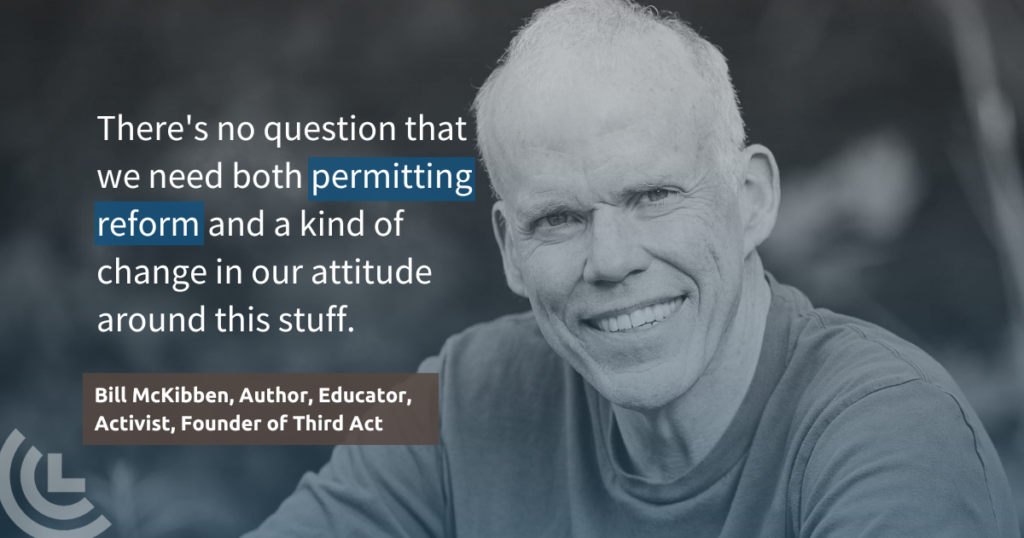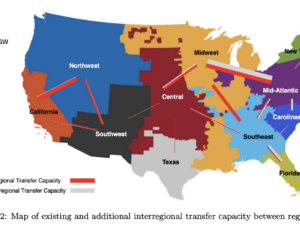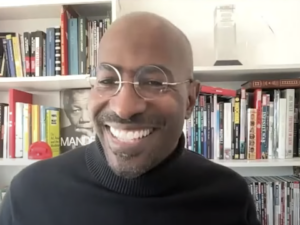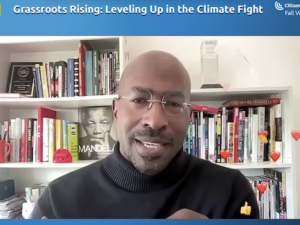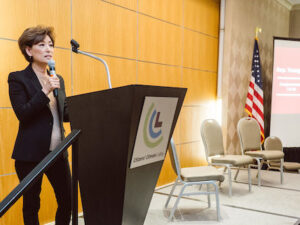Bill McKibben talks YIMBY and clean energy permitting reform
By Samantha Johnstone
CCLers recently had the privilege to hear from Bill McKibben joined volunteers watching virtually and in-person at the Washington, D.C., conference alike. McKibben, a renowned author, educator, environmentalist and co-founder of 350.org and Third Act, gave his insightful perspective on a range of topics, including today’s climate impacts, the need for some YIMBY enthusiasm (“Yes In My Backyard”), and the opportunities presented by clean energy permitting reform.
Watch his remarks here, or read on for a recap:
The relevance today
McKibben opened up by explaining why immediate climate action was imperative at this moment. On June 8, just two days before his talk, the National Ocean and Atmospheric Administration declared El Niño conditions in the tropical Pacific Ocean, and McKibben explained that these conditions will bring drastic detrimental effects. Additionally, McKibben spoke to the wildfire smoke hitting the East Coast after drifting down from Canada.
“For the first time, the people who reside in the most powerful corridor of the Earth have been reminded, in the most dramatic way, of what most people on Earth live with every day,” McKibben said. “Relatively speaking, the power corridor of the world that includes Washington and Wall Street has been isolated compared with the rest of the planet.”
He went on to explain the dangers of poor air quality, referencing the “tightness in your chest and sting in your eyes” that happens every day in places like New Delhi and Islamabad. Additionally, the particulates and byproducts of combustion fossil fuels attack the bodies of vulnerable human beings in fatal ways. And thirdly, worldwide reliance on fossil fuels enables people in control to abuse their power over said scarce resources, thus “degrading and deforming our democracy.”
McKibben emphasized that we are in a “good deal of trouble” as global temperatures continue to rise, but remains optimistic that there is a possibility of more political flexibility than has been available in the past.
Optimistic next steps
Encouragingly, we are seeing a tremendous drop in the price of renewable energy. McKibben believes that the decreased price of solar power, wind power and other renewable energies is “the most important statistic on our planet, because it means there is no longer a deep technological or financial obstacle” to transitioning away from fossil fuels.
“We live on a planet where the cheapest way to produce power is to point a sheet of glass at the sun. That is a remarkable change,” McKibben said.
However, he recognized that we are not moving quickly enough to make the shifts to renewable energy. Although the Inflation Reduction Act has provided some financial flexibility, America is still not on track to follow the Intergovernmental Panel on Climate Change’s recommendation to cut emissions in half by 2030.
“On my watch, 2030 is about six years and six months away. So that is one presidential electoral cycle, three congressional cycles, 24 quarters for the business people,” McKibben said. “We have got to move with great dispatch.”
Moving forward
McKibben recognized that drastic change, while necessary, is extremely difficult because it requires disrupting a centuries-old business model of environmental exploitation and degradation. He set forth two parts that will allow us to move forward quickly where the model is willing to allow.
Arguably the cheapest and easiest part, McKibben advocated for simply cutting energy consumption, particularly through insulating houses. As a rural Vermont native, McKibben recognizes the need for heating during winters, but insulation can help cut consumption of emissions and make it easier to deploy renewable energy as needed.
The more complicated part to the two-fold solution, actually employing renewable energy, requires navigating vested interests and individual preference for maintained lifestyles. Referencing his recent publishing in Mother Jones regarding a proposal for one of the first big wind farms in the Adirondack Mountains that was derailed by a local group resistant to change, McKibben asked us to persuade ourselves, neighbors and friends to not stand in the way of everything, all the time. He proposed a few ideas to help us all think differently than we have been.
- It’s not really your backyard. McKibben explained that while it is useful to protect your own backyard, and in fact, it is one of the things we are called on to do, it is also important to remember it is connected to the rest of the world. In a way, we all share a backyard with each other. Furthermore, he emphasized that those living in rich parts of the world have a strong moral obligation to do so, as they were the ones producing huge amounts of carbon and wrecking the backyards of everyone else in the world.
- We don’t live in our own moment. Every time an individual emits carbon, its impacts are felt across the world. Humorously, McKibben called out drivers who believe they have absolved themselves of climate damage by purchasing a Tesla, because if they have been driving their whole lives, “there is a hell of a lot of carbon to make up for because it’s all still up there.”
- We are in an emergency. In an emergency one has to act differently than they would in normal times. McKibben recognized that to some degree, he understands that people don’t want to look at wind turbines or solar panels. But in an emergency, we cannot afford such a luxury. “I have come to think of a wind turbine on the horizon as something quite beautiful, with the breeze creating a symbol of willingness to take responsibility for our own needs,” McKibben said.
Permitting reform and caveats
McKibben wrapped up his remarks by emphasizing that all of these changes come under the heading of permitting reform, but it is important to keep in mind several caveats as we do it.
McKibben first called for a “fairness test” of sorts, as it is understood that disadvantaged communities often take the brunt of the impacts from energy systems. Those people and communities should be listened to and get an extra level of say in what happens going forward, in order to protect them and their interests.
In a perfect world, McKibben also envisions a system that is not solely reliant on giant energy corporations forever and ever. Projects with more community engagement and stakeholders will not only protect local interests, but can decrease feelings of resistance as people feel they are part of the transition.
Finally, McKibben expressed his view that it makes no sense for permitting reform to make it easier to build pipelines or extract fossil fuels. The permitting must be in line with climate needs.
Wrapping up his talk, McKibben explained that there is an extraordinary amount of things to plan, create and execute in the next decade or two. For example, there are billions of machines and homes that have to be swapped out.
“It is an exciting, engaging task, but we have to do it with justice at the forefront, and we have to do it together, and we have to do it fast,” McKibben said. “And someplace at the intersection of all of those imperatives, hopefully there is a way through.”
Samantha Johnstone is an intern with CCL’s Communications team. Cornell University class of 2026, she is studying Environment & Sustainability with an emphasis in environmental humanities and a minor in communications. Originally from the Bay Area, she is part of the San Mateo County CCL Chapter.

